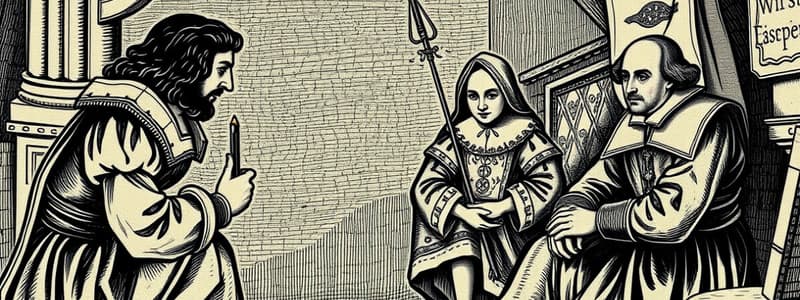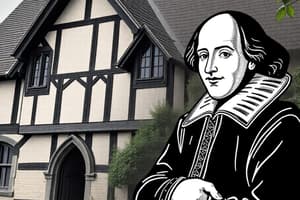Podcast
Questions and Answers
What was one significant event that the Elizabethan era followed?
What was one significant event that the Elizabethan era followed?
- The English Civil War
- The Renaissance
- The War of the Roses (correct)
- The Glorious Revolution
What was one of the regulations regarding women during Shakespeare's time?
What was one of the regulations regarding women during Shakespeare's time?
- Women were banned from acting (correct)
- Women were allowed to act in plays
- Women could own property independently
- Women could not vote in local elections
At what age did Shakespeare marry Anne Hathaway?
At what age did Shakespeare marry Anne Hathaway?
- 22
- 16
- 18 (correct)
- 20
What type of rituals influenced courtship during the Elizabethan era?
What type of rituals influenced courtship during the Elizabethan era?
What was the title of the collection of Shakespeare's works published in 1623?
What was the title of the collection of Shakespeare's works published in 1623?
Which theater company was Shakespeare a member of?
Which theater company was Shakespeare a member of?
What was a common reason for marriages during the Elizabethan era?
What was a common reason for marriages during the Elizabethan era?
What significant health challenge did England face during the Elizabethan era?
What significant health challenge did England face during the Elizabethan era?
In which year was William Shakespeare born?
In which year was William Shakespeare born?
What type of educational institution is believed to have shaped Shakespeare's early literacy skills?
What type of educational institution is believed to have shaped Shakespeare's early literacy skills?
Flashcards are hidden until you start studying
Study Notes
Shakespeare and His Historical Context
- William Shakespeare was born in 1564 in Stratford-upon-Avon during the Elizabethan era, which began around 1558.
- Queen Elizabeth I was the reigning monarch, known for her influence on arts and society.
- The Elizabethan era followed the War of the Roses and a significant split from the Catholic Church, creating a period of religious upheaval.
- Although England experienced exploration and cultural growth, the country also faced challenges such as the bubonic plague.
- Social structures were rigid, with established class systems and strict gender roles, leading to limited upward mobility and women's rights.
- Women were banned from acting, requiring male actors to play female roles in Shakespeare's plays.
- Courtship rituals were elaborate, and marriages were often arranged for social or economic gain rather than love.
Shakespeare's Life and Career
- Shakespeare was the third of eight children. His father was a successful merchant, providing him with a relatively comfortable upbringing.
- It’s believed he attended King’s New School, where he developed skills in reading and writing.
- Married Anne Hathaway at age 18 and had three children before pursuing a theater career in London.
- He was a member of The King's Men theater company and acted at the Globe Theatre, a significant venue for his works.
- Shakespeare's plays gained initial acclaim, but his posthumous fame soared when friends compiled his works into the "First Folio" in 1623.
- Died in 1616 at age 52, leaving a legacy of influential writing that endures through time.
- Shakespeare's works, including "Twelfth Night," are celebrated for their insight into human nature and continue to influence modern literature.
Learning Goals and Activities
- The study unit will focus on the historical context of Shakespeare’s life and works.
- Students will create timelines and read articles about Shakespeare and the Elizabethan era.
- Engagement with Shakespeare's poetry will begin with an examination of "Sonnet 18."
- In-depth analysis of historical context will aid in understanding the deeper meanings within Shakespeare’s plays.
Shakespeare and His Historical Context
- Born in 1564, William Shakespeare's life unfolded during the Elizabethan era, which started in 1558.
- Queen Elizabeth I significantly influenced arts and culture, promoting artistic expression and exploration.
- The era followed the War of the Roses, leading to heightened tensions due to religious changes from the Catholic Church.
- Despite cultural advancements, England faced the bubonic plague, impacting society's well-being and mortality rates.
- Rigid social hierarchies dictated class systems and strict gender roles, limiting opportunities for women and mobility for the lower classes.
- Women were prohibited from performing on stage, necessitating male actors for female roles in Shakespearean plays.
- Courtship and marriage practices were formal, typically designed for social standing or financial advantage rather than romantic inclination.
Shakespeare's Life and Career
- Shakespeare was the third of eight siblings, born to a successful merchant, ensuring a stable upbringing.
- Attended King’s New School, cultivating foundational skills in reading and writing critical for his future career.
- Married Anne Hathaway at the age of 18 and became a father of three before moving to London to pursue theater.
- As a member of The King's Men, he gained recognition and performed at the Globe Theatre, a pivotal venue for his works.
- Initial success in his plays led to posthumous fame amplified by friends who compiled his works into the "First Folio" in 1623.
- Died at 52 in 1616, leaving an enduring literary legacy that significantly shaped future literature.
- His works, particularly "Twelfth Night," are acclaimed for their profound insights into human nature, influencing countless writers.
Learning Goals and Activities
- The study unit emphasizes understanding Shakespeare's historical context and its impact on his works.
- Students will create timelines to trace events in Shakespeare's life and read articles on the Elizabethan era.
- Examination of "Sonnet 18" will serve as an introduction to Shakespeare's poetry, fostering engagement with his language and themes.
- Analyzing historical context enhances comprehension of the deeper meanings and themes within Shakespeare’s plays.
Studying That Suits You
Use AI to generate personalized quizzes and flashcards to suit your learning preferences.




